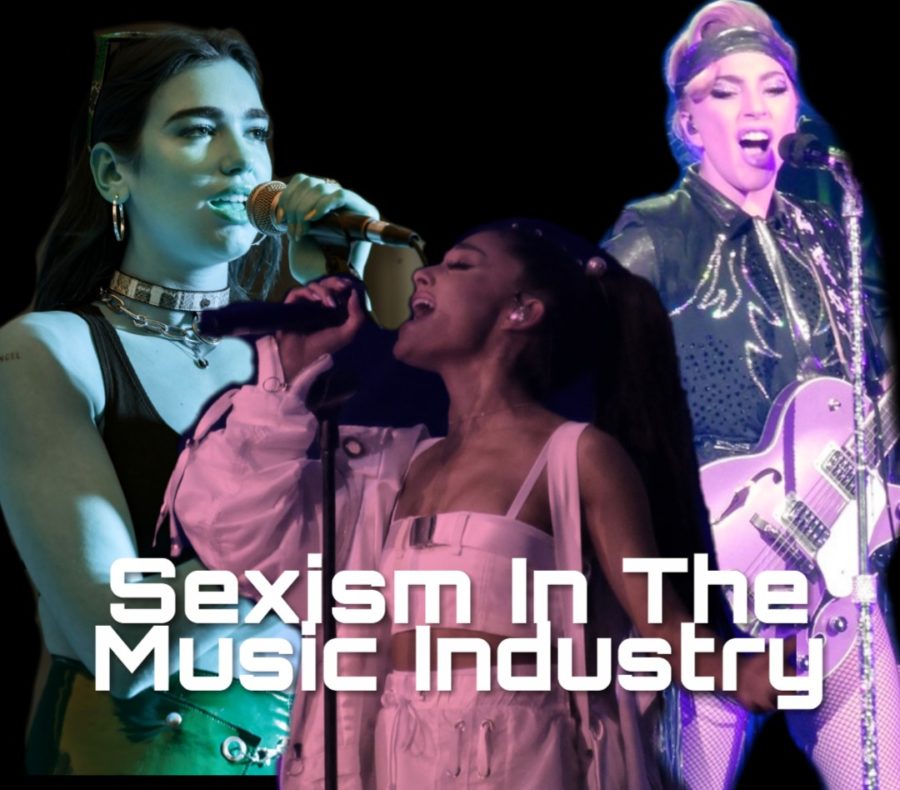Sexism In The Music Industry
The World Behind the Beat
(Left to Right) Female Artists Dua Lipa, Ariana Grande, and Lady Gaga
October 16, 2019
In recent years, music has become one of the most diverse things about global culture with the boom in technology allowing for countries to connect like they never have before. Although music may celebrate the uniqueness of each artist there are restraints in the music industry that the common consumer doesn’t see. From controlling their music releases to even sexual harassment, women have been oppressed behind closed doors hidden by the glamour of fame.

Taylor Swift speaks up about her experiences with sexism in the studio.
The entertainment industry is infamous for cutthroat competitiveness, with everyone trying to get ahead of each other. Women face extra difficulties with constant discrimination from record label executives and producers. One big name artist, Taylor Swift says this was the moment she noticed sexism in the music industry. According to an interview with CNBC, Taylor Swift said “Men in the industry saw me as a kid. I was a lanky, scrawny, overexcited young girl who reminded them more of their little niece or their daughter than a successful woman in business or a colleague.” A common theme amongst the reports made by the females of the industry is the belittling of their place as an individual. Their thoughts and creativity is limited and forced to be catered to the preferences of the males. “For a female artist, it takes a lot more to be taken seriously if you’re not sat down at a piano or with a guitar,” Dua Lipa tells BBC in their Article “Dua Lipa speaks out about sexism in the music industry”.
12th-grade student, Ven Angelino, commented on the importance of workplace equality between the genders. She stated “Women are held to a higher standard…but are treated less than instead of equal to men” in response to what she knows about the gender gap in the workforce. As the conversation progressed into the topic of sexism in the music industry she replied that, “Men think they can get away with and do get away with a lot of things and I feel in America we don’t have that sense of justice to see that sexual harassment is such a bad thing and we are letting people get away with it in a professional capacity which is completely criminal.” Broadening the perspective of the effects of sexism, the president of the Vietnamese Pop Dance Club and Roosevelt Junior, Anh Tang, had extra insight on the extent of sexism within the music world. When asked why female artists are just now speaking up about their struggles with sexism she responded, “It takes a lot of courage to say ‘Hey I’ve been affected by this’… it’s better now than never.” She further explains the issue of discrimination towards women in the industry extends farther than just the U.S. and is present within the K-Pop industry. The flourishing genre is known for its attractive stars or idols and the aesthetics unique to Korean pop. The rapid growth allowed for Asia to have a larger presence in our culture but with this expansion came the larger playing field for corrupt males at the heads of the entertainment companies to exploit their female artists. The competitive environment allows for the CEOs and producers to maintain a harsh grip on idols allowing them to not only control what is put out to the public but perversely pressure their stars into uncomfortable situations. Anh notes that “It’s very disrespectful not only as a woman but as a person.”
While the world of music may seem like a fairytale, a place of creative freedom has become a playground for corrupt officials to exploit the females in the industry who want to create their art for the world. A veil as been deliberately placed over the public eye by these officials to hide their illicit behavior and keep us ignorant of what really happens behind closed doors. It is time for America and even the world to wake up and see the extent to which the systemized sexism of the workplace oppresses females who are just as capable as their male counterparts. We as a society can’t ignore this because the stage is now set for us to let the puppeteers know that their time of pulling strings is over.


